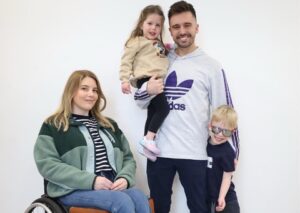
Can a laugh challenge outdated views on disability and open up the dialogue on the wonders of life? If you ask Jade and John Reynolds, the answer will likely be yes. For them, a joyful approach to daily trials and the curved balls life throws at you seem to be key. For context, the couple, who became an online sensation overnight about two and a half years ago, is “interabled”; Jade has been in a wheelchair since she was 12*, and John has ADHD. And in this time, through the authenticity of their posts and their humorous take on complex topics that are part of their married-with-children life, they have been able to speak to a vast and growing audience.
In John’s words, it all started with the success of a post where he told the story of their first date. With its catchy, not purposely planned caption, that video sets the tone of the content you could expect from them: a joyful way of telling challenges that shed light on what life can be like if you have a disability, visible or not.
You were regular social media users, and then… what happened? How did your success start?
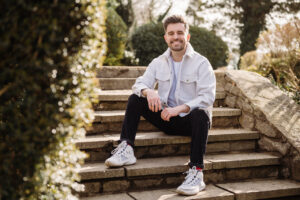 (John) It happened 2 ½ years ago, with the video where I told our first our first date. I took Jade to the cinema, and I hadn’t researched properly (in terms of) accessibility. The second we got there, I realised there were a few steps: oh no, how are we going to get in? Straight away, Jade saw the platform, and the guy went to get the keys. Then he looked at our tickets, and he (pointed out) that the screen was upstairs. I said, “Do not tell me the lift is not working!” He replied: “What lift?” There was none. So I had to carry Jade about 30 steps to take her to the cinema.
(John) It happened 2 ½ years ago, with the video where I told our first our first date. I took Jade to the cinema, and I hadn’t researched properly (in terms of) accessibility. The second we got there, I realised there were a few steps: oh no, how are we going to get in? Straight away, Jade saw the platform, and the guy went to get the keys. Then he looked at our tickets, and he (pointed out) that the screen was upstairs. I said, “Do not tell me the lift is not working!” He replied: “What lift?” There was none. So I had to carry Jade about 30 steps to take her to the cinema.
At first, I called the video “My first date with a wheelchair user”, but I realised it might sound like I was about to say something negative. So, in brackets, I added “Spoiler – I married her”. At the time, I did not know what I was doing. But, soon it got about 2 or 3 million views. I have retold (this story) in different ways ever since. And I think it now has 8 or 9 million views across different platforms.
Speaking about accessibility – entering buildings, travelling, or how cities are designed, do you feel there has been a shift from the past in the years?
(Jade) I lived in London for about ten years, from around 2010. In all honesty, London is awful for accessibility. For example, I can use some stations – but not really, because I can get on some platforms, but then I cannot get off again. Or, if you get off at the wrong platform, there is no way for you to go across to the other platform. But I’d say, in general, there has been a shift because I feel disabled people now are more comfortable to ask for what they need, and I feel like ten years ago, we weren’t thought of in our culture. We were kind of pushed aside. Pretty much everything was for able-bodied people. If you can’t find a way to make it work, you just can’t join. That was the sentiment.
[Not even the hospitality industry seems always to be doing better, ndr]
(John) One time, we went to a restaurant, and Jade had to use the bathroom: it was full of stock, and Jade couldn’t use the toilet. They said: We are so sorry that this happened. But we don’t get many disabled people who come here. Of course you don’t! Because the last person who came and wanted to use the toilet couldn’t use it, and they never came back! Rather than in public or in real life, sometimes, through social media and the internet, it is easier to make your voice heard. Particularly if it is hard for you to get out and about.
This also shows that a lot of businesses and organisations have thought: We don’t need to fix those problems because we don’t even know there is a problem, because we don’t get many people who show us it is a problem. And the reason they don’t get that is because it is such a problem that (disabled people) don’t bother coming. It is a vicious circle.
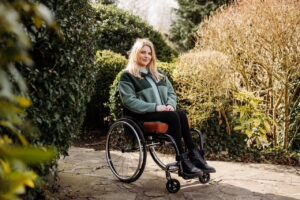 (Jade) (Overall), there has been a shift in the culture. I know now, as disabled people, we can say: “this is not ok. This is not good enough.” We are also part of society, and we want to be involved. We have got a lot to offer. Another big thing is flying. I love to fly, but it is very difficult because I cannot use my wheelchair on an aeroplane, so I am basically stuck in my seat.
(Jade) (Overall), there has been a shift in the culture. I know now, as disabled people, we can say: “this is not ok. This is not good enough.” We are also part of society, and we want to be involved. We have got a lot to offer. Another big thing is flying. I love to fly, but it is very difficult because I cannot use my wheelchair on an aeroplane, so I am basically stuck in my seat.
(John) That is ridiculously common. Every time we’ve shared the story on (how difficult) flying is, you can be guaranteed we would have 40 or 50 other wheelchair users commenting. (Form) their wheelchair being a bit damaged, regularly being forgotten, and there being no aisle seat on the plane.
(Jade) You end up having strangers, people you have just met, helping you onto the loo. It is not very dignified. I am quite confident, so I am happy to ask what I need. But I know from other people, often younger than me, they do not want to make a fuzz. And they end up being in horrible situations. So, there is still a long way to go. The UK is not on the front fore of that. I have travelled a fair bit and find France and Spain quite accessible. And I find America very accessible, probably one of the best places.
From online success to a book that broadens your audience in the real world. And where you answer many questions as well.
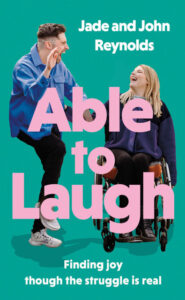 (John) When we met at university I always thought that Jade was very confident in her disability. When I heard her story, it was admirable, and I felt it was very challenging. I feel I have learned a lot because of her and through her. She has managed to overcome real challenges and still thrive in life. Jade never made her trauma appear as a “feel sorry for me” thing. She has gone through so much but hasn’t let it stop her – getting married, having kids, getting a degree, and going to university. We make lots of jokes about it online through the safety of a relationship, obviously! – it is not something I would joke about with someone I didn’t know! People like that (tone) because it removes some of the stigma. If you can laugh about something, it stops you from having a hold over it, maybe.
(John) When we met at university I always thought that Jade was very confident in her disability. When I heard her story, it was admirable, and I felt it was very challenging. I feel I have learned a lot because of her and through her. She has managed to overcome real challenges and still thrive in life. Jade never made her trauma appear as a “feel sorry for me” thing. She has gone through so much but hasn’t let it stop her – getting married, having kids, getting a degree, and going to university. We make lots of jokes about it online through the safety of a relationship, obviously! – it is not something I would joke about with someone I didn’t know! People like that (tone) because it removes some of the stigma. If you can laugh about something, it stops you from having a hold over it, maybe.
Two (big) thoughts are going through people’s heads: they are thinking, could you be attracted to someone in a wheelchair? Or, secondly, could you stay with someone who wasn’t in a wheelchair when you met but now is? People are trying to work it out. But because we got so many questions, we thought (about whether to) keep on (posting) videos that get repetitive with time – because no soon we were done answering one question, we would immediately get asked that question again. One of the easiest ways, then, is to point people toward big questions, like romance, dating, accessibility, dark humour, being a parent, and paralysis.
Important topics discussed… with a laugh?
(Jade) The book is called “Abled to Laugh”. It is a joyful story; it is not pitying or depressing. It is not a tragic story. There are challenging moments in the book and others that are sad. But then it is just overwhelming joyful. Because it is either you laugh or you cry (especially) when you go through really hard times. I think that to be able to laugh, sometimes is healing. We are kind of subverting the story.
(John) People have two big misconceptions. One is that the hardest thing is becoming disabled – and there is so much complication from that; it is probably harder than people ever realise. But, at the same time, paradoxically, it is also so better than people probably realise it is. All at the same time. Jade loves her life. There are very tough moments – we talk about those openly in the book. But we also have those moments that are just wonderful. And yes, there are challenges that she didn’t think she had to contend with, but, as she said, it is not a “feel sorry for me” but more “here is how I’ve got through it”. Maybe there may be some wisdom for you.
What kind of followers do you have? You mentioned comments from people sharing similar experiences.
(John) A lot of people know somebody on some level with disabilities. As someone we follow who is a wheelchair user said, “Disability is the only minority group that many, many people will join, at least as they get older, in some form”. There may not be that many people (going around) in a wheelchair, but disability is so diverse. So many people do have a link to that.
We also talk about parenting – we have an eight-year-old and a five-year-old. So it is a mixture. If we just did disability content, we would probably just be preaching to the choir. Whereas the nice about being followed by all kinds of people is to begin regularly commented: “I’ve never thought of that”. And that is why the book has many facets to it.
It opens the conversation. What do you think about the concept of adaptability, of finding ways that work for your situation?
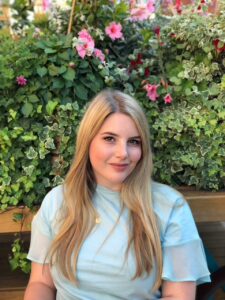 (Jade) Whatever you are doing or trying to do should be seamless. Think about buildings, for example, where everyone goes through the same entrance, and it does not make the disabled person yet again isolated. (If you think,) This changes the mentality. What if there was just a bit bigger toilet that works for disabled people but also benefits older people or anyone with small children: everyone wins. It is not: “Oh no, we are going to have to adapt for you. You are an inconvenience. No! Everyone can benefit from those adaptions.
(Jade) Whatever you are doing or trying to do should be seamless. Think about buildings, for example, where everyone goes through the same entrance, and it does not make the disabled person yet again isolated. (If you think,) This changes the mentality. What if there was just a bit bigger toilet that works for disabled people but also benefits older people or anyone with small children: everyone wins. It is not: “Oh no, we are going to have to adapt for you. You are an inconvenience. No! Everyone can benefit from those adaptions.
From social media success to a book that can reach a broader audience, what are the next steps?
(Jade) This whole thing has been very organic. We have not planned a lot. We didn’t plan anything; it just happened. One of the opportunities was being able to write this book, which we hope will encourage and challenge people, make them laugh, and make them think about life a little bit differently.
(John) Make people laugh and to make people think. And that might be about disability, faith, or being a parent. We enjoy doing the funny content.
—
* As John mentions in one of their TikTok videos, she almost bled to death at 17 during an operation and suffered sepsis while giving birth to their first child.
***
Alley Oop’s newsletter
Alley Oop arrives in your inbox every Friday morning with news and stories. To sign up, click here.
If you want to write to or contact Alley Oop’s editorial team, email us at alleyoop@ilsole24ore.com.